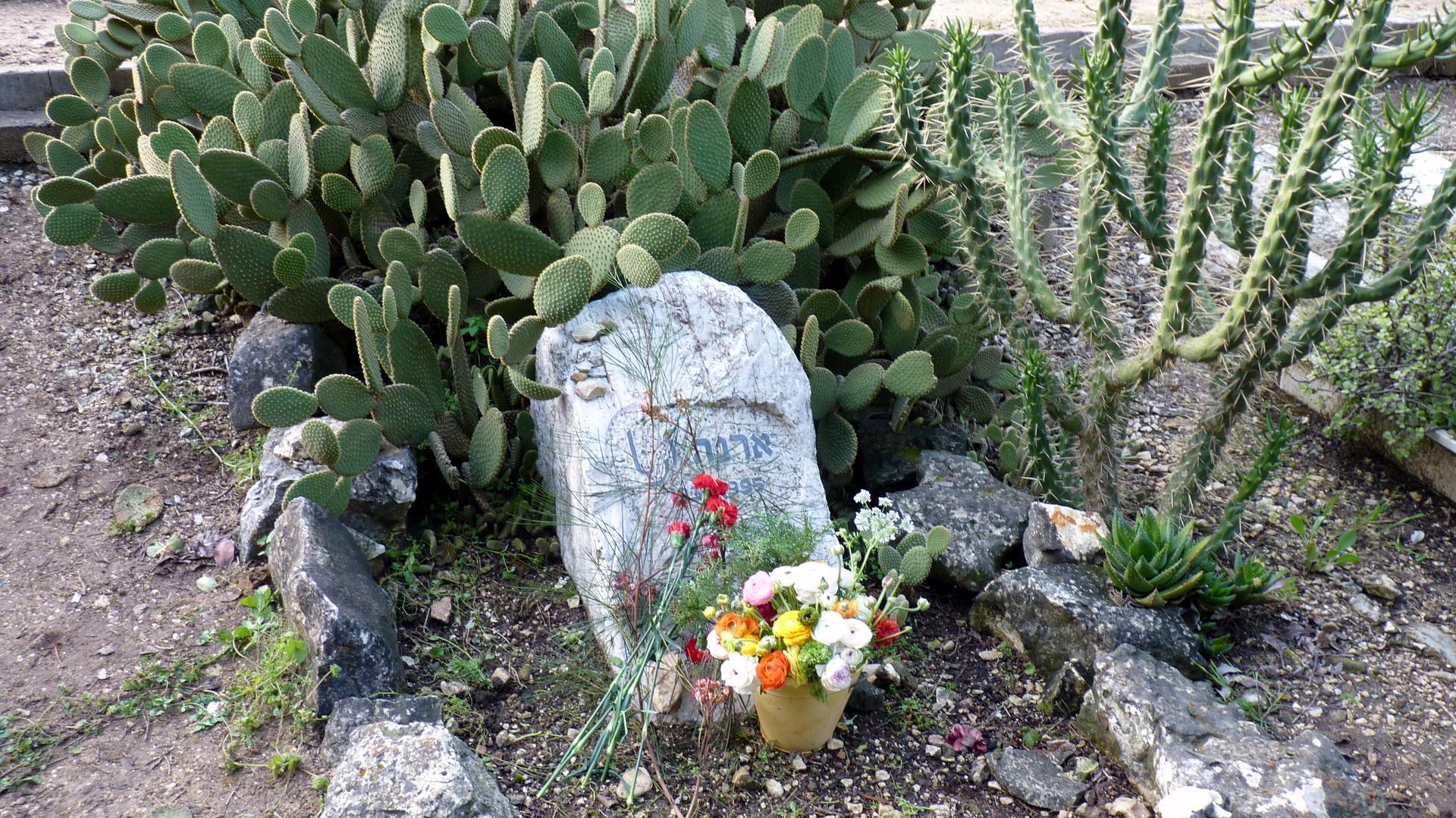Murdered Israeli actor buried
Juliano’s mother, Arna Mer, is also buried at the kibbutz of Ramot Menashe in northern Israel. (photo: Matthew Bell)
By Matthew Bell
Juliano Mer Khamis might be the first half-Jewish shahid. The Arabic word for martyr has been used to describe the well-known Israeli actor who was shot and killed on Monday in the Palestinian town of Jenin, where he lived and worked.
In a place where deep division and distrust is the norm, Mer Khamis embodied the impossible.
He was born to a Jewish Israeli mother and Arab Christian father. He described himself as 100 percent Jewish and 100 percent Palestinian. He was an Israeli citizen who chose to live in a Palestinian refugee camp. He enjoyed some big-time success as a film actor but dedicated himself to running a theatre for kids.
For a man of such contradictions, it made sense that the funeral procession Wednesday for Mer Khamis had elements of the extraordinary.
A caravan of hundreds of mourners drove from the Israeli coastal city of Haifa — where Mer Khamis grew up — to an Israeli checkpoint on the northern border of the West Bank. Israeli authorities allowed his casket to be carried across the border briefly, so that Palestinian friends of Mer Khamis could say their final goodbyes.
Back on the Israeli side of the checkpoint, dressed in black, Jalal Hassan of Nazareth said he was struggling with the murder of his childhood friend. Hassan still spoke of Mer Khamis in the present tense.
“Juliano is unique in many things,” Hassan said. “One, among these things that he’s a person of life, of aliveness, of loving life and loving people. So, it’s so hard to connect, all of a sudden, to connect Juliano with death.”
Especially such a violent death, Hassan added.
Masked gunman
Monday afternoon in the Jenin refugee camp, Mer Khamis was shot multiple times at close range by a masked gunman. It happened close to the Freedom Theatre that the actor created in 2006. Palestinian authorities have arrested a suspect, described as a Palestinian militant.
The co-founder of the Freedom Theatre is a former militant himself. Zakaria Zubeidi is an ex-leader of the Al-Aksa Martyrs’ Brigades and he was once one of Israel’s most-wanted men. Zubeidi called his friend’s killing an assassination. He said there will be no forgiveness for those responsible.
Zubeidi had known Mer Khamis since the early 1990s, when the Israeli actor’s Jewish mother — Arna Mer — ran an arts program for Palestinian youth in Jenin.
Mer Khamis made a documentary about his late mother’s work called “Arna’s Children.” The film follows the lives of several kids from Jenin who worked with Arna Mer. Some of them went on to fight and die during the second Palestinian intifada that began in 2000.
When Arna Mer died of cancer in 1995, her left-wing, pro-Palestinian politics made it difficult finding a place to bury her in Israel. A kibbutz in the north gave the family a burial site, and that is where Mer Khamis was buried Wednesday.
Some of the Palestinian students from the Jenin theatre were at the funeral. They got special permission to enter Israel for the day. One of them said it was the first time he’d ever visited the Jewish state and laid eyes on the sea and that he considered this to be a strange gift from his late teacher.
Israeli columnist Gideon Levy also attended the funeral. He said the last time he saw Mer Khamis was at the opening of Alice in Wonderland at the Freedom Theatre several weeks ago.
Levy said the play might have been “too much for Jenin refugee camp.” In fact, Mer Khamis said as much himself at the opening.
“He said it’s a dangerous play. And it was a dangerous play,” Levy said.
He was one of them
Asked whether he worried about Mer Khamis’ safety in Jenin, Levy said, “No, because I really thought he’s one of them.”
“But now, thinking backwards, I think it was too naïve to think so.”
Mer Khamis’ older brother Spartak said there were plenty of warning signs. The Freedom Theatre was vandalized several times by suspected Islamists who objected to some the content of productions there.
Standing next to his mother’s grave, just a few steps away from his younger brother’s freshly dug grave, Spartak said Juliano was a cultural revolutionary who took a big risk by living and working in the Jenin refugee camp.
“You have to take into consideration that you are amongst organized militias, fully equipped, armed,” he said. “Although his project is of a tremendous importance, very humanistic and very creative.”
“Of course, I’m proud of him,” the older Mer Khamis said of his brother. “But I’m angry at him at the same time, because I would prefer to be proud of him alive than proud of him dead.”
Juliano Mer Khamis leaves behind an eleven-year-old daughter, an infant son and a wife, who is six-months pregnant with twins. His theatre students say they will continue his work and soon, they will be back on stage.
